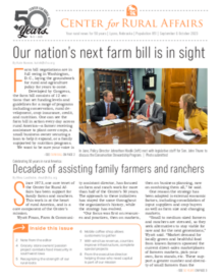Editor's Note
Writing the 50-year features has been very fulfilling.
For those of you who don’t know me very well, I love local history. Wherever I travel, I read all the interpretive boards and brochures and pick up random facts. The more unique, the better. This project has been right up my alley.
This edition’s feature highlights Wyatt Fraas, who has been with the Center for more than 30 years. He can almost write a book on the history of the Center from his point of view. In addition to his personal archives, he has a way of looking at the future that is very special. One of our first conversations pleasantly took me by surprise when Wyatt asked about the future of social media and our website. (Two topics I can talk about all day.)
Another person on our staff who deserves to be recognized for her longevity is Trish Darnell, our office and technology manager. She has been at the Center for more than 25 years and truly is the heart of our organization. She is behind the scenes troubleshooting for upwards of 75 people nearly every day. She could also tell you some great stories from years past.
Thank you to those of you who have written, called, and emailed me and my colleagues about your experiences past and present. The Center has affected thousands of rural people across the country and we will continue this work for another five decades and beyond.
Stay tuned for our next newsletter. The last of our 50-year series features Brian Depew, executive director, and what’s in store for the future of the Center.
In this edition
Our nation’s next farm bill is in sight: Farm bill negotiations are in full swing in Washington, D.C., laying the groundwork for rural and agriculture policy for years to come.
Decades of assisting family farmers and ranchers: Wyatt Fraas, Farm & Community assistant director, has focused on farm and ranch work for more than half of the Center’s 50 years.
Grocery store owners’ passion project combats food insecurity in southwest Iowa: From singing in U.S. Air Force choirs to owning businesses together, Theo and Bonnie Ramsey have come a long way since they met.
Recognizing the strength of our rural roots: The Center works tirelessly to bring together diverse people and cultivate lively and vibrant rural communities. But as grass grows up and out, it also grows down. Our collective action is effective not just because our roots are many; our movement is deliberate, our collaborations are meaningful, and our roots run deep.
Mobile coffee shop allows customers to gather: After 13 years of working as a nurse, Kaelyn Armstrong realized there are other ways to help people than physically healing them. For her, that meant becoming a business owner.
With wind tax revenue, counties improve infrastructure, complete special projects: Over the last 20 years, the windy fields of Iowa have allowed a new kind of opportunity to grow. In 2021, the state boasted the second-largest wind production in the nation and annually generates approximately $57 million in tax revenues for state and local taxing bodies and $67 million in lease payments to landowners.
From the desk of the executive director: Helping those who need capital is part of our mission: Access to capital—who can get money and what they are able to do with it—shapes most everything in rural communities. For 50 years, the Center for Rural Affairs has worked to strategically align capital so everyone who calls rural American home can fully participate in community and economic life.


